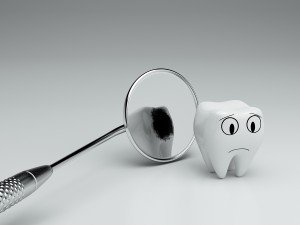What Are The Signs And Symptoms Of Periodontal Disease?
 Periodontal or gum disease is a chronic inflammatory condition that affects the oral tissues surrounding your teeth (a.k.a. the gums). This is a major infection that over time can destroy that bone and tissues supporting the dental structure. The American Dental Association has long recognized the seriousness of periodontal disease in that gum disease is one of the primary causes of tooth loss in adults. Additionally, gum disease can have a negative impact on your overall health and well-being.
Periodontal or gum disease is a chronic inflammatory condition that affects the oral tissues surrounding your teeth (a.k.a. the gums). This is a major infection that over time can destroy that bone and tissues supporting the dental structure. The American Dental Association has long recognized the seriousness of periodontal disease in that gum disease is one of the primary causes of tooth loss in adults. Additionally, gum disease can have a negative impact on your overall health and well-being.
Periodontal and gum disease is typically treated in the form of gingivitis and periodontitis so it is important to recognize the signs and symptoms of these two conditions in order to start treating them as soon as possible. Here is what to look for:
- Gingivitis – signs and symptoms include bad breath, bad taste in the mouth, bleeding and swelling of the gums. Proper dental hygiene including brushing and flossing as well as regular visits to the dentists and professional teeth cleaning can reverse the effects of this condition. The more advanced and invasive form of gingivitis is known as ANUG or acute necrotizing ulcerative gingivitis. This condition is characterized by sore gums and the appearance of a whitish membrane. In most cases, antibiotics will be required in order to treat ANUG.
- Periodontitis – this condition involves the destruction of the bone and connective tissues. It is caused by bacterial enzymes or toxins. Signs and symptoms include receding of the gum tissue and exposure of the roots.
The teeth become increasingly more sensitive to changes in temperature or you will see the development of new cavities. The pocket between the gums and teeth grow deeper which makes it extremely difficult to remove any plaque that develops and bacteria begin invading the surrounding structures.
As the gums continue pulling away from the teeth, pus develops in between them and your permanent teeth will loosen in their sockets. At this point, only your dentist will be able to determine whether or not your teeth can be saved.
The ADA has estimated that 75{3b0f9398becb40f4bdd8fe95c600d2c252c33730296b97da1b334948809cb5c4} of all adults aged 35 and older will develop some form of periodontal disease. If you fall in that age group and are concerned about your gums and teeth, you should consider making an appointment at Community Dental Group today. We can examine your gums and teeth to determine if you have periodontal disease and prescribe an effective treatment that will restore them to a healthier state.